
The Miracle Piano Teaching System is educational software which uses a MIDI keyboard to teach how to play the piano. It was published in 1990 by The Software Toolworks for the Nintendo Entertainment System, Super NES, Macintosh, Amiga, Sega Genesis, and MS-DOS compatible operating systems.
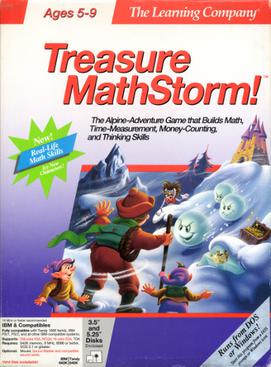
Treasure MathStorm! is an educational computer game intended to teach children ages five to nine mathematical problem solving. This sequel to Treasure Mountain! is the sixth installment of The Learning Company's Super Seekers games and the second in its "Treasure" series.

OutNumbered! is an educational video game published by The Learning Company in 1990 for both Windows and Macintosh PCs. It is aimed at children ages seven to fourteen and is designed to teach children mathematical computation and problem solving skills.
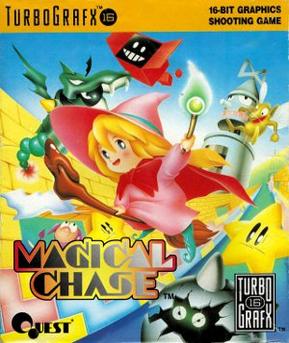
Magical Chase is a 1991 horizontally scrolling shooter video game developed by Quest and published by Palsoft and Turbo Technologies Inc. for the TurboGrafx-16. The game stars a young witch apprentice named Ripple, who broke a promise to her teacher by accidentally releasing six demons from a forbidden book, joined by her star companions Topsy and Turvy on a quest to catch and seal the demons back into the book.

The Playroom is a video game first created in 1989 for DOS, Apple II and Macintosh computers. The game was compatible with the TouchWindow utility. It was ported to the Amiga and FM Towns computers in 1992 and 1994 respectively and then remade for Microsoft Windows and Macintosh in 1995. It was designed for ages 3 to 6 manufactured by Broderbund. A follow-up game titled The Treehouse came in 1991 as well as a sequel to this game, called The Backyard in 1993.
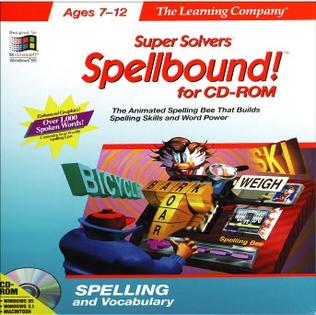
Spellbound! is an educational computer game made and distributed by The Learning Company aimed at teaching spelling, vocabulary, and language development to children ages 7 to 12 years. The objective of the game is to play spelling-related games to qualify and compete for successively higher bracket spelling bees, concluding with the player competing in the national spelling bee. The original game, released in 1991, was compatible with computers running DOS 3.3 or higher. A 1993 CD release added spoken dialogue and was compatible with Windows 95 and Macintosh.
McGee is a series of computer games released by Lawrence Productions for Kindergarteners ages 2–4.

Arthur's Teacher Trouble is a book in the Arthur series, released in 1986. It was written by Marc Brown and published by Little, Brown and Company and The Living Books Company.
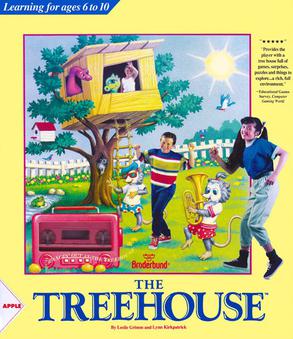
The Treehouse is an educational point-and-click personal computer game developed for DOS and then ported to Macintosh and the FM Towns, with Windows versions arriving later. Following the success of The Playroom, Broderbund created The Treehouse, which provides more content and furthers the user's ability to explore. First released in 1991, most copies were sold in educational supply stores rather than mainstream stores that sold computer software; it included a sing-along cassette tape. It was re-released in 1996 for Windows 3.1 and Windows 95. Although the Windows version has the same general activities, the characters, interface, and locations are different.
The Oppenheim Toy Portfolio is a nationally recognized independent consumer review of children's media. It was founded in 1989 by child development authors Joanne Oppenheim and her daughter Stephanie Oppenheim. The newsletter is published quarterly and have held an annual series of awards that have gained attention in the industry. They have spoken on children psychology/behavior, toys, and child media on OPRAH, CNN, NBC Nightly News, ABC World News Tonight, MSNBC, Lifetime, and both are Contributors to NBC's TODAY Show.
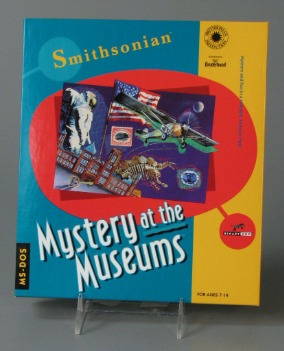
Mystery at the Museums is an educational video game developed by Binary Zoo Software and published by Artech Studios for MS-DOS in 1993. The game is Binary Zoo's second release as well as the second in their "Adventures With Edison" series.
Hoppers is a classic Peg solitaire game released by ThinkFun in 1999. Players set up the board according to the pictures on each challenge card, then "leap frog" all the green frogs until only the red frog remains.
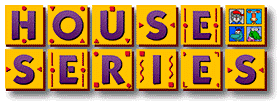
Early Learning House or simply the House Series is a collection of four main educational video games and two compilations for the Windows and Macintosh platforms, developed by Theatrix Interactive, Inc. and published by Edmark software. Each different game focuses on a particular major learning category with selectable skill settings for preschooler, kindergarten and elementary learners. Millie's Math House (1992) on mathematics, Bailey's Book House (1993) on language, Sammy's Science House (1994) on science, and Trudy's Time and Place House (1995) on history and geography. A spin-off, Stanley's Sticker Stories (1996), sees players create animated storybooks with the series' characters. Millie & Bailey Preschool and Millie & Bailey Kindergarten each contain the combined activities from two of the four software products. In addition the programs can be configured by an adult mode to suit students with special needs. Most of the activities in every game have two modes, one to allow learners to explore and try it out for themselves and the other for learners to follow specific tasks set by the game characters. Learners also have the option to print pictures of creative activities and record sounds in phonics activities. Later the games were re-developed by Houghton Mifflin Harcourt Learning Technology and re-published by The Learning Company with newer graphics and additional activities.

Math Blaster! is a 1983 edutainment video game, and the first entry in the "Math Blaster" series within the Blaster Learning System created by Davidson & Associates. The game was developed by former educator Jan Davidson. It would be revised and ported to newer hardware and operating systems, with enhanced versions rebranded as Math Blaster Plus! (1987), followed by New Math Blaster Plus! (1990). A full redesign was done in 1993 as Math Blaster Episode I: In Search of Spot and again in 1996 as Mega Math Blaster.
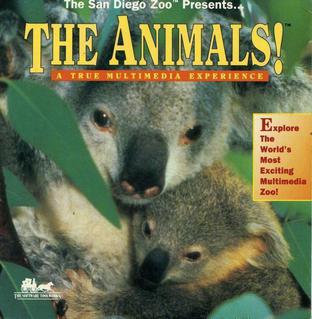
The San Diego Zoo Presents: The Animals is an educational game developed by The Software Toolworks and Arnowitz Studios and published by The Software Toolworks in 1992 for Windows. Arnowitz Studios developed the multimedia assets and The Software Toolworks did the software development. A release for 3DO was planned for release in November 1993 but was ultimately launched in 1994. The game was then ported to Sega CD in 1994.

3-D Dinosaur Adventure is an educational video game by Knowledge Adventure released on CD-ROM for MS-DOS compatible operating systems in 1993. Versions for Macintosh and Windows 3.x were published in 1996. A 1997 re-release and an updated version for Macintosh and Microsoft Windows is titled 3-D Dinosaur Adventure: Anniversary Edition.
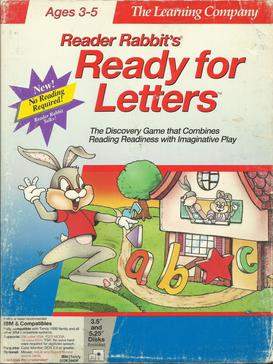
Reader Rabbit's Ready for Letters is a 1992 video game and the fifth game of the Reader Rabbit franchise. Although a spin-off title, it is designed for ages 3 to 6 to teach prereaders about becoming literate and phonics.

Where in the World is Carmen Sandiego? is a game within the Carmen Sandiego franchise made for the Prodigy Interactive online service, a "special edition" and Prodigy service adaptation of the 1985 Broderbund educational game of the same name.















